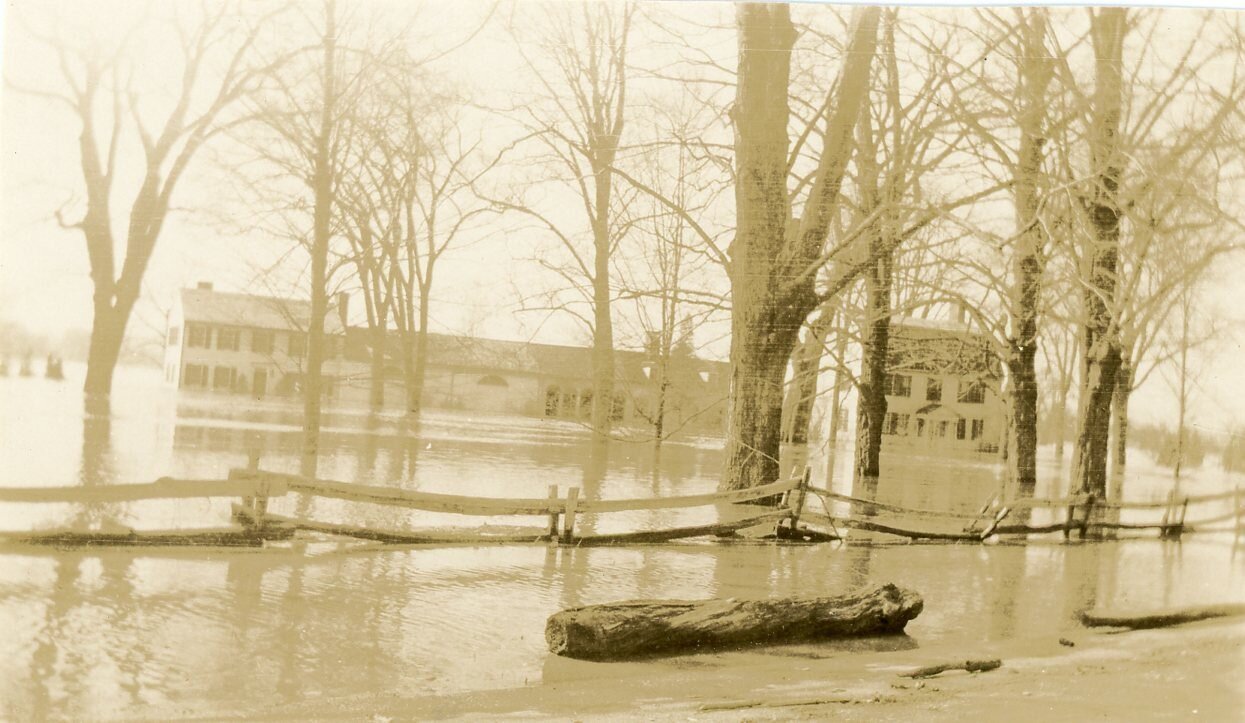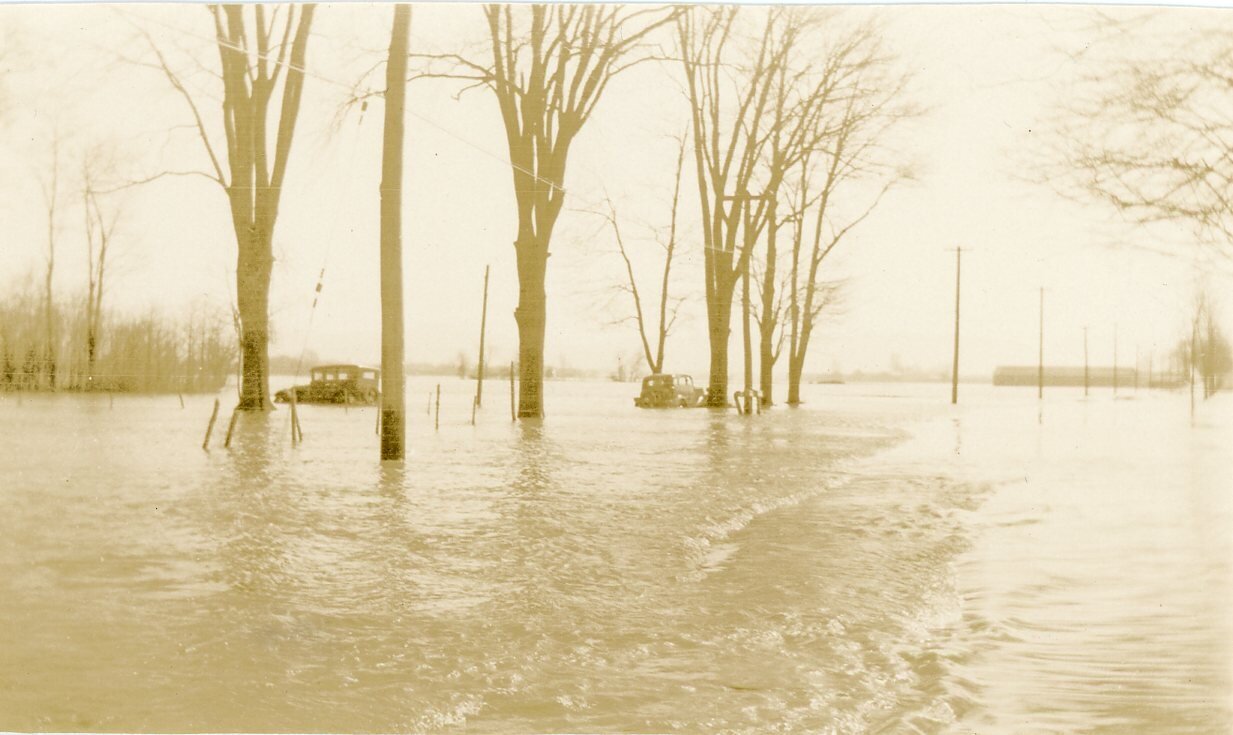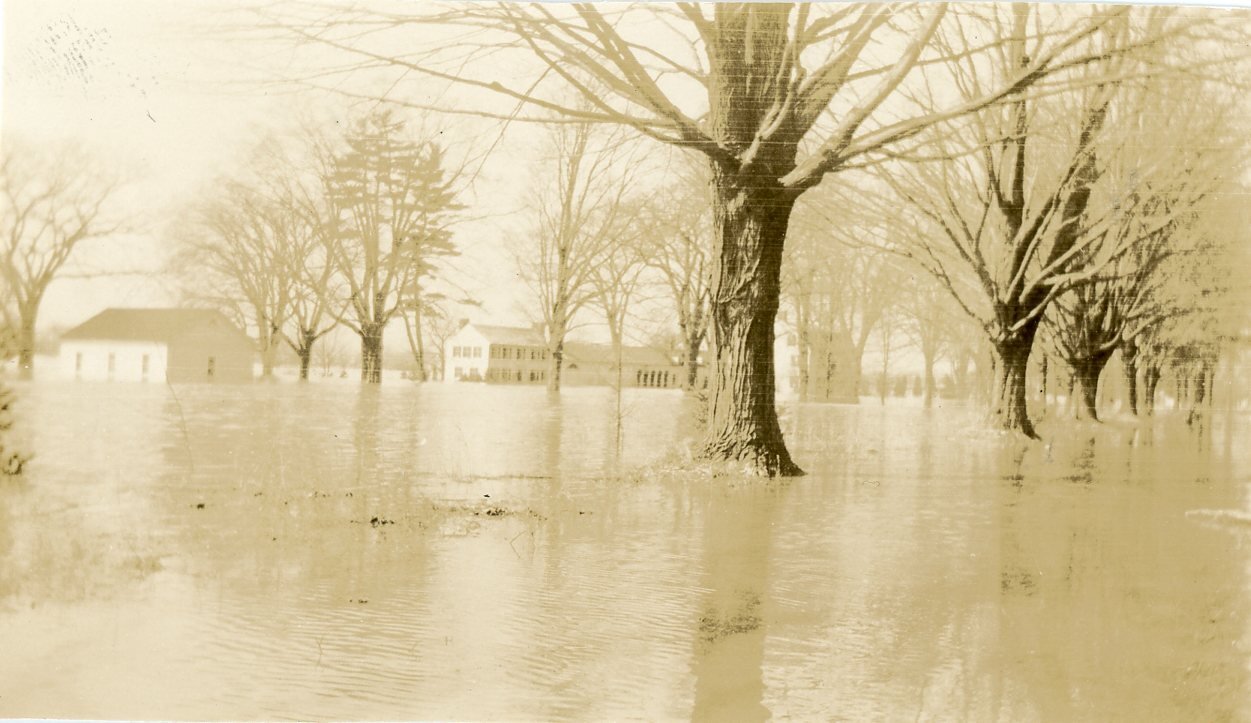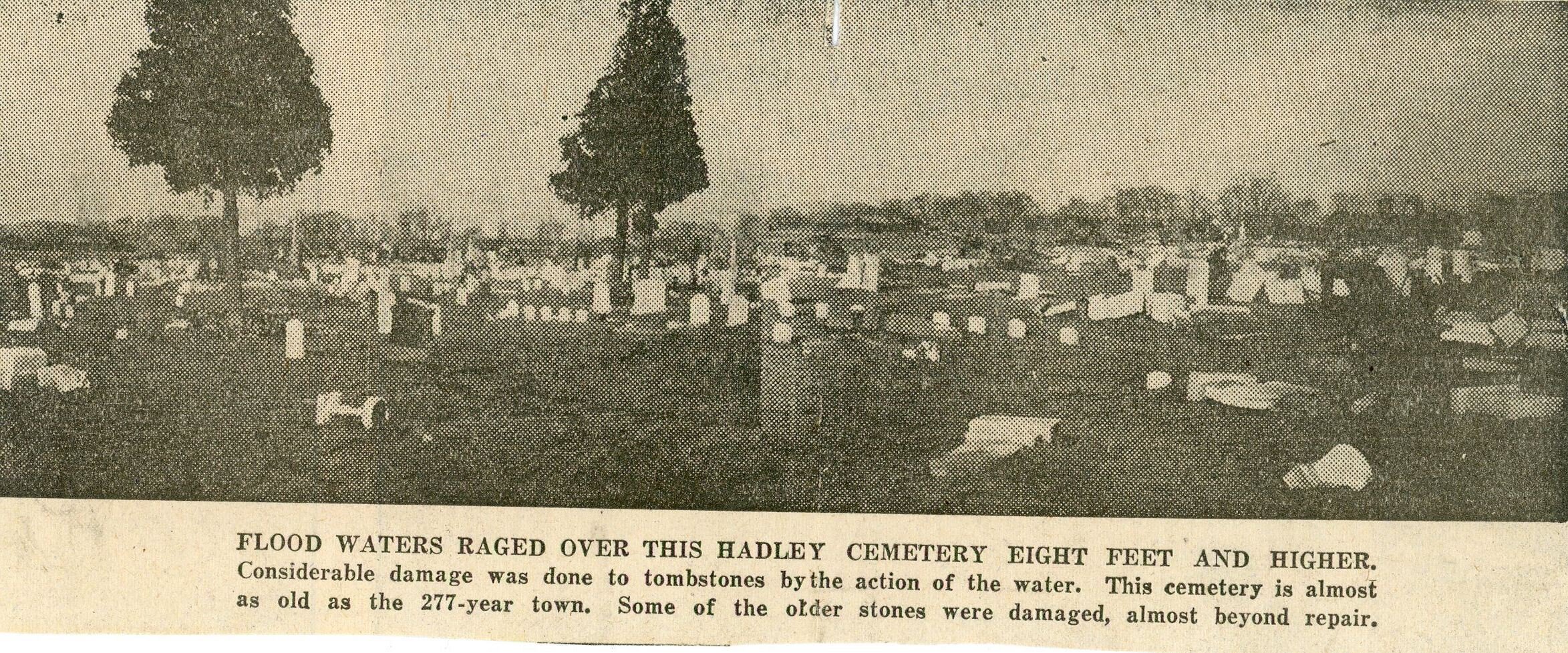James Lincoln Huntington’s letter to his brother on the Flood of 1936
April 24, 1936.
Dear Constant:
On January 30th I went with Tom Barbour to Miami in Florida. At the end of two weeks, during which time we studied the bird life in the Everglades almost daily, I expected to come home. Tom said that I was not fit to come back and I realized that I really needed more than two weeks vacation as I had not really relaxed for so many years, so we went on to Cuba and after a day in Havana we went down to Soledad, where Papa and Mamma went in 1884. The Atkins family gave the land to Harvard for a tropical garden on their plantation you probably know back in 1908. Tom was instrumental in bringing this about. As Director of the Museum he is supposed to make an official visit to the gardens annually and this was his first visit since the destructive hurricane of last September. We had a most interesting time in the garden and we made a very careful study of the bird life as well as studying the damage done to the trees. We came back to Havana and with that beautiful city as a base made long trips around the Western part of the Island. We returned to Florida by way of Key West. We then went over to the West Coast over to the East Coast again - visiting many very interesting spots en route. We spent two days at Tom’s orange grove in a little town called Eau Galli where he has been every year since he was a child. Then we motored back to Miami and I came North. I reached Boston on Sunday, the 8th of March. It was very mild and it rained almost every day that week. On Friday we were alarmed about the high water in Hadley, but by Sunday all danger seemed over. On Tuesday it began to rain again with a vengeance - pouring the whole of Tuesday night and showing no let up Wednesday morning. I telephoned Hadley about noon and the news of rapidly rising water and heavy downpour being most disquieting, I prepared to leave as soon as I could get things in shape. Unfortunately it meant seeing several patients and I could not actually leave until 3 P.M. The rain was coming down in such sheets that I felt as if I were in a submarine rather than in a motor car. In Worcester I encountered a rushing torrent as I went up towards Leicester. In one place in Cherry Valley the water was so deep that firemen standing in water up to their waists were directing traffic in a single line through the highest part of the road. I finally got through, but I must have been over half an hour going through Worcester. I made good progress from then on and while the water was often over the road ‘twas never deep enough to be menacing. The rain continued in torrents. At the church in Hadley they told me that I could not get to Forty Acres in my car, but on my promising to leave the car at the head of the street and going on foot the police let me by. They said that the road at Coleman’s brook was under deep water and so it was. At first I did not think I had better try it, but I met a Polish boy who had just waded through and he said he thought I could make it if I hurried. The Connecticut River was rushing up Coleman’s brook right over the road, carrying big ice cakes with it, but I finally got through wet well above my knees. I found John and Dawnie and Mrs. Comins just leaving my Chaise House - it was about half past six o’clock and dark - having carried the most perishable things upstairs. The water was pouring over the North driveway, but I waded through. The land around the house was dry and I went out on the back stoop and looked out at the lights in Hatfield across a roaring angry sea. That roar continued night and day for four days and nights. I came back from the stoop convinced that we were in for a far worse flood than Hadley had ever known. I started for the Chaise House, but John and Dawn called me to come back and I found that they were right and again I had to wade nearly up to my knees to get back to the road. We went into John’s house and I got off my wet stockings and into some gold stockings of John’s and we tried to eat–listening all the time to flood bulletins coming over the radio. Soon - about 7:30 - John said that he could stand it no more - he was going to get his cows out of the barn to high land in the pasture. Dawnie and I sat listening to the constantly graver tidings of bursting dams, falling bridges and rising waters. Then word came over the radio that a huge dam at Vernon Vermont about thirty miles North of us was likely to go out any minute - that if it did a wall of water fourteen feet deep would sweep the Connecticut Valley. They said that local authorities would give the warning. Soon the Telephone Company telephoned that if and when the Vernon dam went the fire siren in Hadley would blow for fifteen minutes and everyone within twenty feet of the then flood level must seek safety on higher land! About this time John came back and said that all the cows except eleven were in the pasture and that we must lead the eleven up the road as the water was so deep between the barn and the pasture the cows would not go into it. I led a heifer half a mile up the road to that house that stands back and above the watering trough above the Comins house on that road that leads to Mt. Warner. I did it, but I don’t think either the cow or I enjoyed it! When we came back to John’s house the siren began blowing and it was a fearful sound above the roaring of the River and the beating of the rain. We got the six calves (I carried a new born one in my arms) into the horse barn about three feet higher than the cow barn and taking a few things we went up to the house I have described where we took John’s cows. They gave us a cordial welcome. No one thought of going to bed - the radio was going all the time and soon we heard that it was a mistake - that the Vernon dam had not gone and probably would not go no matter how high the River rose. I went down to the River edge every hour and by means of little sticks kept track of the rise and it was almost a foot an hour the early part of the night. It only rained fitfully as dawn came and the river while it continued to rise was coming up only an inch or two an hour. We could not reach the farm except in an automobile going very slowly or wading, but we got down to the Comins house on the highland across the street and we could see the water all around our house and just lapping the road in front of it. John Sessions had a canoe and we paddled over Barrett’s land down to John’s house and barn. His house and the horse barn were still out of water. The water continued to rise but much more slowly. I did not go to bed that night and about three o’clock I found that the water had stopped rising, but it stayed practically stationary until eight Friday morning when it very slowly began to go down. But it cleared off Friday morning and with the falling water my spirits rose. I went to Amherst, got shaved, bought some Khaki trousers and hip rubber boots, and felt like a new man. I came back to find that the river had fallen nearly three inches and that Mrs. Comins had taken the pictures I am sending to you. About a half hour later I was paddling the canoe with one of John’s men to the Chaise House. I unlocked the door and pushed the rear of the canoe in, getting out on the third stair going upstairs then covered with water. We found all in confusion - chairs and tables floating about with pots and pans from the pantry. Looking out of the kitchen windows with a mad rushing torrent throwing spray against the panes is a sight I shall ever remember.
At the time these pictures were taken the river extended from about half a mile to the West of the Hatfield church well up into our woods across the street with just the crown of the road above the water.
The water went down steadily in spite of showers and by early afternoon of Saturday was out of the house. I went into the house again Saturday P.M., paddling as before only getting out on the step and pushing my way with difficulty into the house because of inches of thick mud. We put things to rights a bit but I did not attempt to open the safe. Fred and Elsie arrived a little later at our farm house home and spent the night in Amherst. Sunday morning was clear and much colder. I got a Polish boy and wading to the house cleaned off the back stoop six inches deep in mud. Fred and Elsie came down and took me round by Mt. Warner down to the village where I got my car at the house where I left it on the Wednesday before. They had put it away safely in a high and dry garage. Fred and Elsie pushed on to New York and I came back and opened the safe and found it half full of water so I took out all the wet papers and took them back to the farm house and began drying them at once. I tidied up a bit in both houses and made arrangements for cleaners to come in at once and begin before the silt dried. I was off for Boston early in the morning, going down to Forty Acres first and seeing both avenues dry enough to walk without rubber boots and during the night the fearful roar of the river died down so as to be almost imperceptible. Things are pretty much at rights now. We have carted 40, 2 horse, dump carts of silt out of the sunken garden. The lawns have been partially scraped, harrowed, seeded and rolled. The electric wiring has all been dried out and replaced. The foundation under the stoop and the flagstones have not been put back yet, but that will be done any day now. The houses have been aired and both houses cleaned. They still have that horrid boiled turnip smell, but it is fading out.
I don’t believe Benjamin has written to you yet, but he apparently has found the girl of his choice and it looks as if it were a real engagement. She lives directly across the street and is a great friend of the Barbour girls. Her name is Susan Brewer. Her father is Robert Brewer, Harvard 1901 - he has never done very much. Elsie (Carr) his wife has had plenty of money and Bob has never had to work. He is a nice simple fellow. Elsie is very lovely, but very shy. Susie is a pretty girl, rather petite. Of course it seems impossibly long before they can think of being married - two years more in the Medical School and then hospitals, but I don’t know that there is anything to do but hope for the best.
Mercedes has been very ill - her old pelvic trouble - but I arranged to have the best man in Boston operate of[sic] her and all seems to be going well - the operation was about a week ago. I have just seen her and she sent her love to you.
Sally joins me in greetings to you all.
Always affectionately,
(s) Jimmy



